Unit 3 Could you please clean your room?全单元课件
文档属性
| 名称 | Unit 3 Could you please clean your room?全单元课件 | 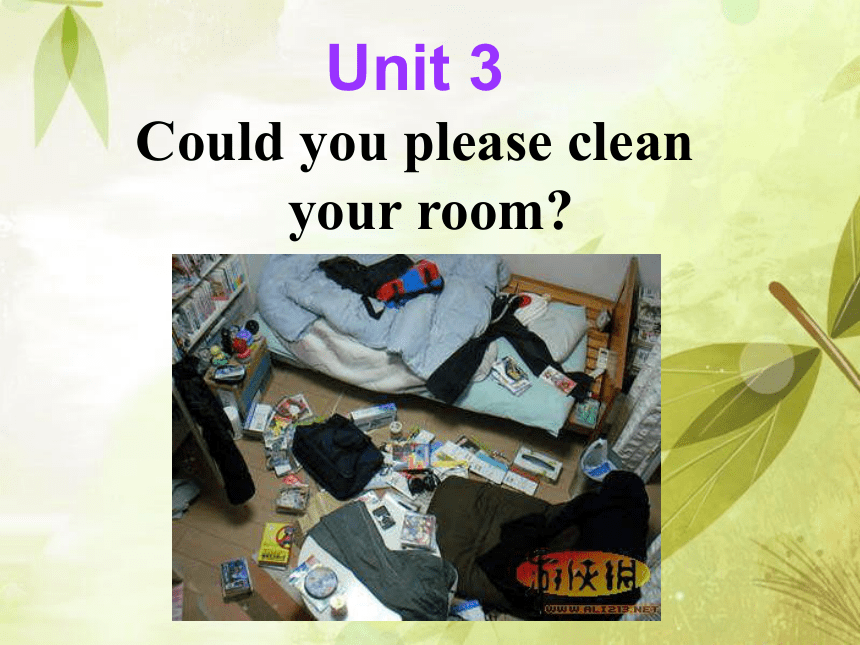 | |
| 格式 | zip | ||
| 文件大小 | 14.8MB | ||
| 资源类型 | 教案 | ||
| 版本资源 | 人教新目标(Go for it)版 | ||
| 科目 | 英语 | ||
| 更新时间 | 2015-03-27 21:53:09 | ||
图片预览



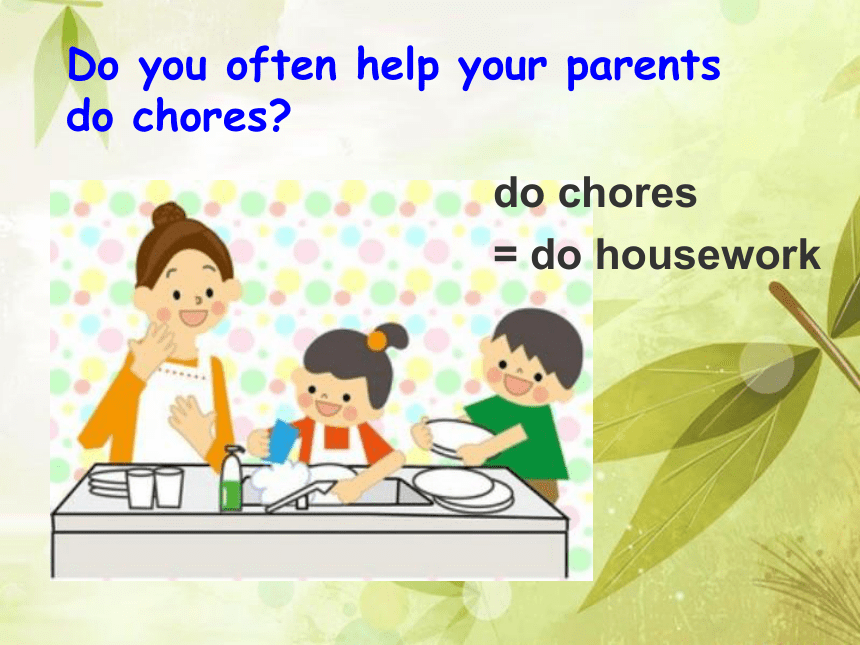
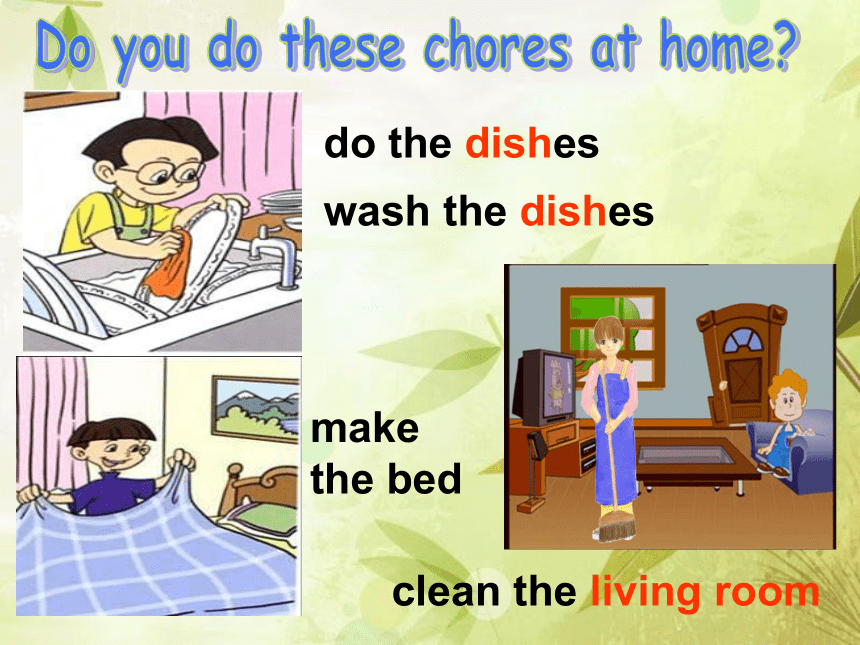
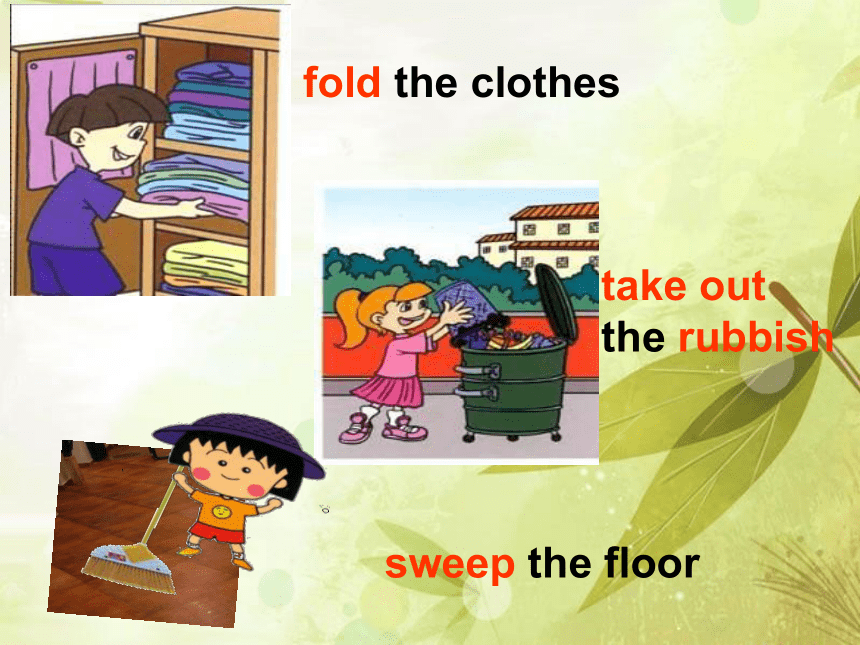
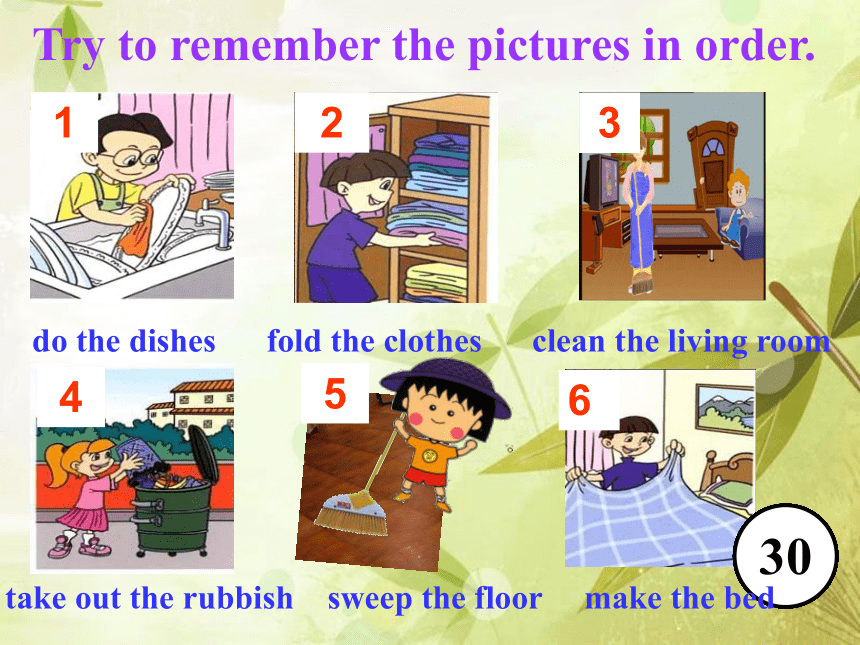


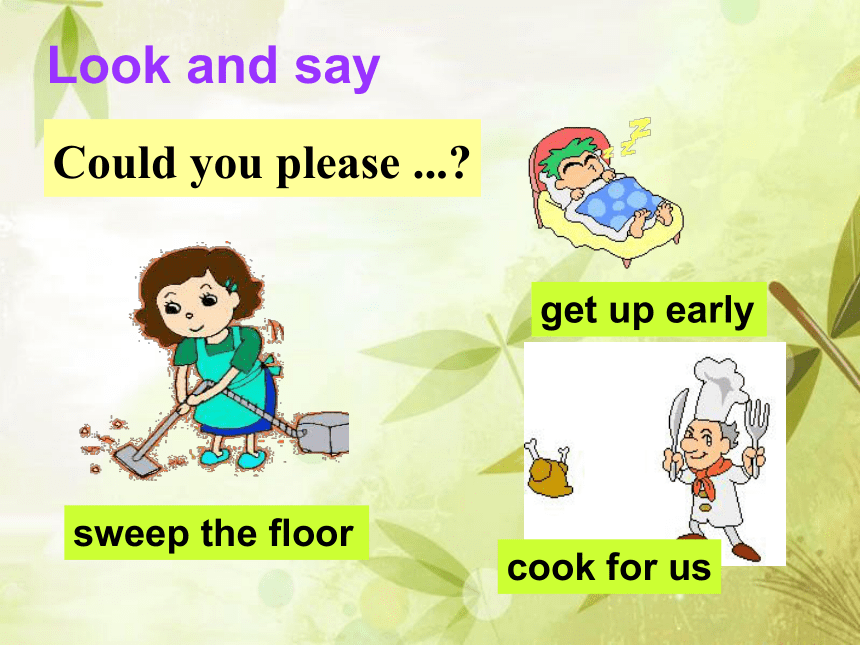


文档简介
课件119张PPT。Unit 3
Could you please clean your room?Section A
Period Onerubbish
take out the rubbish
fold
sweep
floorn. 垃圾;废弃物
倒垃圾
v. 折叠;对折
v. 扫;打扫
n. 地板 Words Do you often help your parents
do chores?do chores
= do houseworkclean the living roomdo the dishesmake the bedDo you do these chores at home?wash the dishestake out the rubbishfold the clothessweep the floor41231234567891011121314151617181920212223242526272829306Try to remember the pictures in order.5do the dishes fold the clothes clean the living room take out the rubbish sweep the floor make the bed I think it is a little bit hot in our classroom and I want to ask someone to open the window. What can I say?I can say
1. Open the window!
2. Can you open the window?
3. Could you please open the window? Can you find the difference?Different ways of saying.Which is the most polite expression?sweep the floor get up earlycook for usCould you please ...?Look and say有礼貌地提出请求句型:Could you please do sth.?
请你(做)……好吗?
Could you please not do sth.?
请你不要(做)……好吗?Conclusion could 与 can 的用法区别
could 与 can 都是情态动词,二者都可用
于表示请求的句子中,但是用法稍有不同。
can 表示一般性的请求,语气较随便,常
用于熟人之间或长辈对晚辈、上级对下级
的场合。例如:
Can you tell us your story, Tony?
请你给我们讲讲你的故事好吗,托尼?could 表示有礼貌的请求,语气委婉,
常用于非熟人之间或晚辈对长辈、下级对上级的场合。例如:
Could you pass the salt to me?
请你把盐递给我,好吗?
Could you please clean your room?
请你打扫一下你的房间,好吗?Could you please clean your room?a dirty roomI’m sorry. I’ll do it right away.
不好意思,我马上做。What will you response if somebody
says “Could you please …”?Could you please take out the rubbish?Yes, Sure./ Of course. / All right. / OK. A: Could you please make the bed? B: Sorry, I can’t.
I have to do my homework.(have to do my homework)-- Sorry, I can’t.
I am studying for my test.(am studying for my test)-- Could you please fold the clothes?smoke in publicCould you please not smoke here?I’m sorry. I’ll go out.Do you do these chores at home? Discuss them with your partner. (1a) 1. do the dishes 2. take out the rubbish
3. fold your clothes 4. sweep the floor
5. make your bed 6. clean the living room Listen. Who will do these chores? Check Peter’s mother or Peter. (1b)√ √ √ √ √ √ A: Could you please sweep the floor?
B: Yes, sure. Can you do the dishes?
A: Well, could you please do them? I’m going to clean the living room.
B: No problem.Example:Make conversations about the chores in 1a. 1c sweep the floordo the dishesmake the bedtake out the rubbishfold the clothesclean the living room(study for my test)(clean the living room)(babysit my sister)(Yes, sure.)(do my homework)
(Yes, sure.)pairworkA: Could you please take out the rubbish?B: Yes, sure./ Of course./ All right. /OK.Sorry, I can’t. I have to do my homework.Sorry, I can’t. I am doing the dishes.Unit 3
Could you please clean your room?有礼貌地提出请求句型:Could you please do sth.?
请你(做)……好吗?
Could you please not do sth.?
请你不要(做)……好吗?ConclusionYes, Sure./ Of course. / All right. / OK. Sorry, I can’t.
I have to do … could 与 can 的用法区别
could 与 can 都是情态动词,二者都可用
于表示请求的句子中,但是用法稍有不同。
can 表示一般性的请求,语气较随便,常
用于熟人之间或长辈对晚辈、上级对下级
的场合。例如:
Can you tell us your story, Tony?
请你给我们讲讲你的故事好吗,托尼?could 表示有礼貌的请求,语气委婉,
常用于非熟人之间或晚辈对长辈、下级对上级的场合。例如:
Could you pass the salt to me?
请你把盐递给我,好吗?
Could you please clean your room?
请你打扫一下你的房间,好吗?Listen. Peter asks his father if he can do four things. What does his father say? Check yes or no. (2a) √√√√2bListen again. Why does Peter’s father say “no”? Draw lines to the reasons in the chart below.√√√√A: Could I use your computer?
B: Sorry. I’m going to work on it now.
A: Well, could I watch TV?
B: Yes, you can, but first you have to clean your room.Pair workMake conversations between Peter and his father.2cUnit 3 Could you please clean your room?
Section B (1a-1e)sweep the floor take the dog for a walkfold the clothes have a testgo to the movies make bed go for a ride do the dishestake out the rubbish clean my living roomhave a party1. buy some drinks and snacks____________
2. borrow some money______________
3. clean your room__________________
4. invite my friends to a party_____________
5. go to the store_________________
6. use your CD player________________
7. take out the rubbish________________
8. make your bed____________________
9.move the big chair to the bedroom_________
teenagersteenagersteenagersteenagersparentsteenagersparentsparentsparentsCould you please…?Could I…? clean your room
take out the rubbish
make your bedinvite my friends to a party
buy some drinks and snacks
use your CD player
borrow some money
go to the store 1b Use the phrases in 1a to make conversations.1c Listen to a conversation between Sandy and her mom. Check( ) the things in 1a that you hear.? 1. buy some drinks and snacks
2. borrow some money
3. clean your room
4. invite my friends to a party
5. go to the store
6. use your CD player
7. take out the rubbish
8. make your bed
___ ? __ 9.move the big chairs to bedroom ??????buy drinks and snacks
go to the store borrow some money,
clean her room ,
use the CD playermove the big chairs to the bedroom,
clean the living room1d Listen again. Fill in the chart.1. Could I invite my friends to a party?
我可以邀请我的朋友们来参加聚会吗?
invite作及物动词, 意为“邀请; 招待”; 常用结构为:
(1)invite sb. to. . . 意为“邀请某人到某地/参加某项活动”。例如: Thank you for inviting me to your house.
谢谢你邀请我去你家。
(2)invite sb. to do sth. 意为“邀请某人做某事”。例如: He
wants to invite me to join the English club.
他想邀请我参加英语俱乐部。知识点【达标检测】
①他们将邀请一位著名的科学家做演讲。
They’ll a famous scientist a speech.
②这个周末吉姆想邀请朋友们来参加他的生日聚会。
Jim wants to his friends his birthday party this weekend.
答案: ①invite; to give/make ②invite; toConclusion 1.词汇:invite (1)invite sb. to. . . (2)invite sb. to do sth. ,
2. 如何礼貌地提出要求,礼貌地请求允许做某事。
1).-Could you please …?
-Sure./ Sorry, I can’t. I have to …
2). -Could I …?
- Sure./ Sorry./No, you can’t. ...
Unit 3 Could you please clean your room?
Secition B 2a-2e
Should kids do C_ _ _ _s?h o r eLead-in pictures first sentence the main ideathe title Skimming It is important for children to do chores. Parents should take care of children, but there is no need for us to do everything for them. It is not enough for us to take care of Cindy, I also need to teach her how to take care of herself and others. The earlier she learns to be independent, the better it is for her future.look after Cindy do everything for herThere is no need for me to do
everything for her!There is no need Is it enough? It is not enough to look after her. take care of otherslook after herlook after othersdepend on
her mother too much independent adj.Do it by myself ! independence n.Ms. MillerMr SmithNoYesShould children do chores at home?2bMs. Miller’ cons No!For childrenHousework is _____________________For parentsIt is__________ job a waste of their time For Ms Miller herselfMs Miller ________________themdoesn’t mind doing parents' Why?Should children do chores at home?2cWhy is housework a waste of
children’s time?Group discussion2cspend time onin order to stress2dWhat is a waste of your time? _____________________ is a waste of
my time. It is a waste of my time to_________ ______________________.Playing computer games play
computer games 2dHousework is a waste of children’s time. Mr Smith’s pros Yes!helps to develop __________________.teaches how to ___________________. their independence look after themselveshelps to understand________________.the idea of fairnessFor children:Why?Should children do chores at home?2cindependentfuture 2dThe earlier_____________
_______________________,
the better_______________ children learn
to be independent,
it is for their future. Ms. Miller says no. She thinks it is parents’ job to do chores. Children have to spend time on their schoolwork in order to get into a good university . So housework is a waste of their time. Also, she doesn’t mind doing chores.
Should children do chores at home?2dSummary of the textShould children do chores at home?Summary of the text However, Mr. Smith agrees. He thinks it is not enough to just get good grades. children these days depend on parents too much. Doing chores helps to develop their independence, teaches how to take care of themselves and helps understand the idea of fairness. The earlier children learn to be independent, the better it is for their future.2dProblem solving Could I help you, mom?No, go and do your homework.???????2ea waste of time, there is no need for … to,
do not mind, spend time on, in order to,
it is not enough to, the earlier… the betterUseful expressions
independent VS depend on
spend time on
a waste of
take care of
there is no need for… to...
it is not enough
skimming
1.It is not enough to just get good grades.
2. Children should do chores at home.
3.The earlier children learn to be independent, the better it is for their future.
What have you learned in this class? Words and phrases Reading skill Actions to take Love our mom and dad,
Let’s help them do chores!
Love ourselves,
Let’s do chores!Dear mom, Yours,
xx Write a letter to your mom about your opinions .HomeworkThanks!Unit 3
Could you please clean your room?Section B 2
3a—Self checkAre you a polite student?How can we be polite?Don’t jump the queue.offer the seat to the old.obey the traffic rules.Can you say anything else about polite behavior? DiscussionDo you think children should do some chores at home? Why or why not? Discuss this with a partner and take notes.WritingWrite a letter to the Sunday Mail and
express your opinion.Dear Sir or Madam,
I think /believe that ________________.
I agree/disagree that ________________.
I think it is fair/unfair for children to __________________________________.
I think children should/should not ____because __________________________.
For example, they should/
should not ________________________
because __________________________.
Yours truly,
__________1. 信头:发信人地址和日期。
有时可省去发信人地址,但一般要写日期。放在信纸的右上方。
2. 称呼:对收信人的尊称。
常用Dear,后用名字,而Mr,Mrs,Miss后不能单独用名字,而是姓或姓与名,如:John Smith的称呼,是Mr Smith,Mr John Smith或 Dear John。称呼后用逗号。
3. 正文。写作指导4. 结尾:发信人对收信人的谦称或敬语。放在信的右下方。要特别注意英语习惯,不可根据汉语意思写“此致敬礼”、“祝您健康”之类的中国式的结尾语。
写给同龄人或年长的朋友: Yours? sincerely,Yours等等。
写给亲朋好友: Love,Best wishes等等。
5. 签名:一般在结尾语的下面一行。 常见的私人信件的开头方式:
高兴:I was so glad/pleased/happy to receive your letter.
感谢:Thank you for your wonderful gift / your interesting letter.
关心与询问:How are you these days?/ How are you getting on these days?/ How are you getting on with your work/studies?
抱歉:I am sorry that I did not write to you sooner but I have been very busy these days. 一般在表示道歉没有及时给对方写信
时,还要简述原因或写上安慰的话。
遗憾:I was sorry to learn that you did not do well in the examination. / I was so upset to hear that you are ill these days. I do hope you are getting better.help with housework and chores at home
have enough stress from school
spend the time on school work in order to…
There is no need for them to…
It is important for sb. to do sth.
It’s not enough to…
develop children’s independence
The more…, the more…Useful phrasesMake a list of chores using these
verbs.
1. do _______________________
2. clean _____________________
3. make _____________________
4. fold _______________________
5. sweep ____________________
6. take out ___________________Self checkdo the dishesclean the living roommake your bedfold your clothessweep the floortake out the rubbishAre these polite requests or
permissions? Write the numbers in
the correct places in the chart.
1. Could you please do your homework?
2. Could I watch TV?
3. Could you take out the rubbish first?
4. Could I use your computer?
5. Could I leave now?
6. Could you come back before nine?RequestsPermissions2451363. Use the questions in activity 2 to
write a conversation. A: ________________________________
B:________________________________
_________________________________
A: ________________________________
…Could you please do your homework?OK, but after that could I play basketball
for a while?Sure, that will be ok.— Excuse me, Betty. Could you help
me, please?
— _________. Is this big box?
2. — _________________ your watch?
—I think it is broken.CertainlyWhat’s wrong with根据语境,写出适当的答语或问句3. — Thank you very much.
— ______________.
4. —______________?
—It’s a quarter to twelve.
5. — ______________________ to drink?
—Yes. I’d like a glass of orange juice.You’re welcomeWhat’s the timeWould you like something单项选择1. — Could you please give me a book?
— .
A. Yes, I can’t.
B. No, I can.
C. Yes, here you are.
D. No, I don’t want to help you.
2. — Could you please clean the bike?
— .
A. No, I am cleaning it.
B. No, I can.
C. Yes, I can’t.
D. Sorry, I am busy now.CD3. These boxes are heavy. Could you______ them?
A. carrying B. carry
C. to cry D. carries
4. I want ______ these things in the box.
A. put B. putting
C. to put D. puts
BC5. -- Could I look at your pictures -- Yes, of course you ____.
A. could B. can C. will D. might
(03 武汉)
6. _______ you pass me a pen?I’d like to write down the telephone number.
A. Need?? B. Could C. Must? D. Should
(2002北京市海淀区)BB请根据汉语提示完成下列句子
1. His sister has to ____________ (洗餐具) after dinner.
2. Could you please _____________ (叠衣服), Jenny?
3. Ben likes to _______________ (打扫卫生).
4. Linda, help your mother ______________ (倒垃圾).
5. My brother hates to _________(做家务).do the dishesfold the clothesdo the cleaningtake out the rubbishdo chores 根据提示完成下列句子
1. I’m going to _______ (work out / work on) my computer.
2. My mother likes to _____ (make / do) breakfast.
3. His grandfather is a great ____ (cook /cooker).work onmakecook4. I like cleaning the bike because it’s __________ (boring / interesting).
5. His math teacher went to a _______ (meet /meeting) yesterday.
interestingmeeting选词填空1. I ____ doing the dishes. It’s too boring.
2. I’m going to ________my English project and then meet my friends.hatework onhate,take care of,work on,use,forget3. My mom gets really angry when I
_______ to clean my room.
4. Can I ____ your dictionary, please?
Mine is at home.
5. Could you ___________ my cat
when I’m on vacation?forgetusetake care ofUse the questions in activity 2
to write a conversation.
A: _______________________
B: _______________________
…一、 重点短语
1. go out for dinner 出去吃饭
2. stay out late 在外面待到很晚
3. go to the movies 去看电影
4. get a ride 搭车
5. work on 从事
6. finish doing sth. 完成做某事
7. clean and tidy 干净整洁
8. do the dishes 洗餐具
9. take out the rubbish 倒垃圾
10. fold your/the clothes 叠衣服
11. sweep the floor 扫地
12. make your/the bed 整理床铺
13. clean the living room 打扫客厅14. no problem 没问题
15. welcome sb. 欢迎某人
16. come home fro m school/ work放学/下班回家
17. throw down 扔下
18. sit down 坐下
19. come over 过来
20. take sb. for a walk 带某人去散步
21. all the time 一直;总是
22. all day/evening 整曰/夜
23. do housew ork 做家务
24. shout back 大声回应
25. walk away 走开
26. .share the housework 分担家务27. a comfortable home 一个舒适的家
28. in surprise 惊讶地
29. get something to drink 拿点喝的东西
30. watch one show 观看一个节目
31. hang out 闲逛
32. pass sb. sth. 把某物传给某人
33. lend sb. sth. 把某物借给某人
34. get sth. wet 使某物弄湿
35. hate to do sth. 讨厌做某事
36. do chores 做杂务
37. help sb. (to ) do /with sth?帮助某人干某事
38. bring a tent带顶帐篷来
39. buy some snacks买些小吃40.invite sb. to a party邀请某人参加聚会
41.enough stress足够的压力
42.A waste of time浪费时间
43.in order to do为了
44. get good grades取得好成绩
45.mind doing sth. 介意做某事
46.depend on依赖;依靠
47. develop children ’ s independence发展孩子的独立性
48. look after/take care of 照顾;照看
49. do one’ s part in (doing ) sth.
做某人分内的事重点句型
1. Could you please…..do sth. ?
Could you please clean your room?
你能整理一下你的房间吗?
2. I have to do some work.我必须干些活。
3. Could I+ do sth. ?eg:Could I use your computer?
我可以用一下你的电脑吗?
4. She won’ t be happy if she sees this mess.
如果她看到这样乱七八糟的话,她会不高兴的。
5. For one week, she did not do any housework and neither did I.
整整一周,她什么家务活都不干了,我也一样。
6. My mom came over as soon as I sat down in front of the T V .
我一在电视机前坐下,我妈妈就过来了。
7. hate + ( to do/ doing) sth.Eg:I hate to dochores.also 是比较正式的用语,语气较庄重。它通常放在句中,位于行为动词之前,连系动词之后; 如有助动词或情态动词,一般放在助动词或情态动词之后。例如:
Peter also has two brothers.
彼得也有两个兄弟。 also, too, either, neither 的用法I am also a student. 我也是一名学生。
Mrs. Green can also sing the song in Chinese. 格林夫人也能用汉语唱这首歌。 For one week, she did not do any housework and neither did I.
neither 用作副词,作“也不”解释,放在句首,表示前面否定的内容也适用于另一个人或物,句子须采用部分倒装。此时也可用nor替换 neither 使用。例如:
— I?don’t?like?this?dress.?
我不喜欢这件连衣裙。
— Neither?/?Nor?do?I.?我也不喜欢。
注意:neither 之后的主语要置于助动词或系动词之后。neither 用作代词,表示“两者都不,双方均不”。例如:
He?answered?neither?of?the?letters.?
他两封信都没回。
— Which?one?would?you?like??
你喜欢哪一个?
— Neither.?
两个都不喜欢。?2. either 表示“也”时,一般只用于否定
句,且置于句末。例如:
I don’t know him. Tom doesn’t know
him, either.
我不认识他,汤姆也不认识他。
If you don’t go there, he won’t go
there, either.
如果你不去那儿,他也不会去那儿。
注意:either 本身没有否定的意义。所以多与 not 连用。 2. too 是普通用词,多用于口语,语气较随便。一般用在肯定句中,放在句末。例如:
I’m in Row 1, too.
我也在第一排。
注意:also和too一般都用于肯定句,很
少用于否定句。 take 有关的短语 (1)take off 脱下;(飞机)起飞
----Please take off your coat, It’s warm here.
---The plane took off at 9:00 am.
(2)take …to …把。。。。带到。。。。。
(3)take sb. for a walk 带某人去散步
(4)take exercise 运动,锻炼
(5)take one’s time 不用急,慢慢来
(6)take a bus(ship/train)乘坐公共汽车
(7)take turns 轮流,替换
(8)It takes sb. sometimes to do sth. 做某事花费某人多长时间
as soon as 一.....就.....,引导时间状语从句。
这个短语用的比较常用,口语和书面语都可以。它的特点是,在句子中的位置比较灵活,而且可以用于各种时态。例如:
I’ll write you as soon as I get there.
我一到那儿就给你来信。(一般现在时)
As soon as I went in, Kate cried out with pleasure.
我一进门,Kate 就高兴的叫起来。(一般过去时)
I’ll return the book as soon as I have read it.
我一读完就把书还回去。(现在完成时)
Amy left as soon as he had drunk his coffee.
Amy一喝完咖啡就走了。(过去完成时)4.Two hours of TV is enough for you.
两个小时的电视对你是足够的。Ten years is a long time. 5. in surprise 吃惊地
surprise un. 惊奇;惊讶
cn.令人惊奇的事物
I looked at him in great surprise because he changed so much.
I have a surprise for you.lend “借给;借出”
表示“把某物借给某人”,英语用lend sth to sb
borrow“借进;借入”
表示“向某人借某物”,英语用borrow sth from sb
keep 做“借”讲时,是延续性动词,通常表示借了某物多长时间,常与表示一段时间的时间状语连用
1. Could you please clean your room?
Yes, sure./ Of course/ Certainly.
2.Could you please do the dishes?
Sorry/ No, I can’t.
Key sentence structures Could you(please)+ V-原形?
表示委婉地提出请求I have a headache.I’m very busy.… I have to do my homework.2) Would you like to do sth?
3 ) Shall I/we do sth?
4 ) Let’s do sth.也可表示请求。 1) Would you mind cleaning your room ? Could I stay out late? Could I please use the car?Sorry, you can’t. I have to go to a meeting.Could I please get a ride? No, you have a test tomorrow.Yes, you can. Ask for permission politely.3. could与can的区别
could与can都是情态动词,could是can的过去式。二者都可用于 表示请求。但是用法稍有不同。
can表示一般性的请求,语气随便,常用于熟人之间或长辈对辈,
上级对下级的场合; Can you tell us your story , Tony ? could表示有礼貌的请求,语气委婉,常用于非熟人之间或晚辈对长辈,下级对上级的场合。 Could you tell us if it snows in winter in Australia ? Sure . 用括号内所给词的适当形式填空。
1. When did your daughter finish __________(write) the composition?
2. He _______(reply) with a short note the day before yesterday.
3. We should learn to be ___________(independence).
4. Our teacher is a woman of _________(fair).
5. China and India are _________(develop) countries.
6. To my ________(surprised), there is 50,000 yuan in the paper bag.
7. They spent one million dollars ________(build) the bridge.
8. Doing chores teaches the children how to take care of _________(them).
9. The _______(early) kids learn to be independent, the better it is for their future.10. Could you please _______(take) out the rubbish? 一、用所给词的适当形式填空。
1.I really hate_________(listen)to the loud music.
2.Neither of his parents_________(like)doing chores.
3.Jim spent five hours in finishing________(draw)the picture.
4.The kids saw the robot throw the ball into the box in________(surprised).
5.Tom’s mother is very busy, so he needs________(help)out around the house.根据句意、首字母和汉语提示完成句子
1.She d_________(掉落)the plate on the ground and it broke into pieces.
2.It’s w_________(浪费)to throw away glass, paper and metal.
3.That company p__________(提供)poor children with 3,000dollars last year.
4.Good sleep helps the body and brain grow and d________(发展).
5.The students are waiting for the r_______(结果)of the exam.1.John, please don’t t_________(扔)waste paper on the ground.
2.Could you please p_________(递)me a cup of tea?
3.The boy often b__________(借)some books from our school library.
4.Jenny h__________(讨厌)doing homework on Sundays.
5.There are five f__________(手指)on each hand.根据句意、汉语意思和首字母提示完成句子。
1.The children are picking up the r_________(垃圾)in the river.
2.Children often help s__________(打扫)the rooms in the old people’s home.
3.There are some dirty clothes on the f_________(地板)in his bedroom.
4. ---Mary, could you help f_________(折叠)the clothes?
---Yes, sure.
5.Linda often helps her mother________ _______ ________(洗餐具)after dinner.
6.Jack, remember to_______ _______ _______(整理床铺)after you get up.
Could you please clean your room?Section A
Period Onerubbish
take out the rubbish
fold
sweep
floorn. 垃圾;废弃物
倒垃圾
v. 折叠;对折
v. 扫;打扫
n. 地板 Words Do you often help your parents
do chores?do chores
= do houseworkclean the living roomdo the dishesmake the bedDo you do these chores at home?wash the dishestake out the rubbishfold the clothessweep the floor41231234567891011121314151617181920212223242526272829306Try to remember the pictures in order.5do the dishes fold the clothes clean the living room take out the rubbish sweep the floor make the bed I think it is a little bit hot in our classroom and I want to ask someone to open the window. What can I say?I can say
1. Open the window!
2. Can you open the window?
3. Could you please open the window? Can you find the difference?Different ways of saying.Which is the most polite expression?sweep the floor get up earlycook for usCould you please ...?Look and say有礼貌地提出请求句型:Could you please do sth.?
请你(做)……好吗?
Could you please not do sth.?
请你不要(做)……好吗?Conclusion could 与 can 的用法区别
could 与 can 都是情态动词,二者都可用
于表示请求的句子中,但是用法稍有不同。
can 表示一般性的请求,语气较随便,常
用于熟人之间或长辈对晚辈、上级对下级
的场合。例如:
Can you tell us your story, Tony?
请你给我们讲讲你的故事好吗,托尼?could 表示有礼貌的请求,语气委婉,
常用于非熟人之间或晚辈对长辈、下级对上级的场合。例如:
Could you pass the salt to me?
请你把盐递给我,好吗?
Could you please clean your room?
请你打扫一下你的房间,好吗?Could you please clean your room?a dirty roomI’m sorry. I’ll do it right away.
不好意思,我马上做。What will you response if somebody
says “Could you please …”?Could you please take out the rubbish?Yes, Sure./ Of course. / All right. / OK. A: Could you please make the bed? B: Sorry, I can’t.
I have to do my homework.(have to do my homework)-- Sorry, I can’t.
I am studying for my test.(am studying for my test)-- Could you please fold the clothes?smoke in publicCould you please not smoke here?I’m sorry. I’ll go out.Do you do these chores at home? Discuss them with your partner. (1a) 1. do the dishes 2. take out the rubbish
3. fold your clothes 4. sweep the floor
5. make your bed 6. clean the living room Listen. Who will do these chores? Check Peter’s mother or Peter. (1b)√ √ √ √ √ √ A: Could you please sweep the floor?
B: Yes, sure. Can you do the dishes?
A: Well, could you please do them? I’m going to clean the living room.
B: No problem.Example:Make conversations about the chores in 1a. 1c sweep the floordo the dishesmake the bedtake out the rubbishfold the clothesclean the living room(study for my test)(clean the living room)(babysit my sister)(Yes, sure.)(do my homework)
(Yes, sure.)pairworkA: Could you please take out the rubbish?B: Yes, sure./ Of course./ All right. /OK.Sorry, I can’t. I have to do my homework.Sorry, I can’t. I am doing the dishes.Unit 3
Could you please clean your room?有礼貌地提出请求句型:Could you please do sth.?
请你(做)……好吗?
Could you please not do sth.?
请你不要(做)……好吗?ConclusionYes, Sure./ Of course. / All right. / OK. Sorry, I can’t.
I have to do … could 与 can 的用法区别
could 与 can 都是情态动词,二者都可用
于表示请求的句子中,但是用法稍有不同。
can 表示一般性的请求,语气较随便,常
用于熟人之间或长辈对晚辈、上级对下级
的场合。例如:
Can you tell us your story, Tony?
请你给我们讲讲你的故事好吗,托尼?could 表示有礼貌的请求,语气委婉,
常用于非熟人之间或晚辈对长辈、下级对上级的场合。例如:
Could you pass the salt to me?
请你把盐递给我,好吗?
Could you please clean your room?
请你打扫一下你的房间,好吗?Listen. Peter asks his father if he can do four things. What does his father say? Check yes or no. (2a) √√√√2bListen again. Why does Peter’s father say “no”? Draw lines to the reasons in the chart below.√√√√A: Could I use your computer?
B: Sorry. I’m going to work on it now.
A: Well, could I watch TV?
B: Yes, you can, but first you have to clean your room.Pair workMake conversations between Peter and his father.2cUnit 3 Could you please clean your room?
Section B (1a-1e)sweep the floor take the dog for a walkfold the clothes have a testgo to the movies make bed go for a ride do the dishestake out the rubbish clean my living roomhave a party1. buy some drinks and snacks____________
2. borrow some money______________
3. clean your room__________________
4. invite my friends to a party_____________
5. go to the store_________________
6. use your CD player________________
7. take out the rubbish________________
8. make your bed____________________
9.move the big chair to the bedroom_________
teenagersteenagersteenagersteenagersparentsteenagersparentsparentsparentsCould you please…?Could I…? clean your room
take out the rubbish
make your bedinvite my friends to a party
buy some drinks and snacks
use your CD player
borrow some money
go to the store 1b Use the phrases in 1a to make conversations.1c Listen to a conversation between Sandy and her mom. Check( ) the things in 1a that you hear.? 1. buy some drinks and snacks
2. borrow some money
3. clean your room
4. invite my friends to a party
5. go to the store
6. use your CD player
7. take out the rubbish
8. make your bed
___ ? __ 9.move the big chairs to bedroom ??????buy drinks and snacks
go to the store borrow some money,
clean her room ,
use the CD playermove the big chairs to the bedroom,
clean the living room1d Listen again. Fill in the chart.1. Could I invite my friends to a party?
我可以邀请我的朋友们来参加聚会吗?
invite作及物动词, 意为“邀请; 招待”; 常用结构为:
(1)invite sb. to. . . 意为“邀请某人到某地/参加某项活动”。例如: Thank you for inviting me to your house.
谢谢你邀请我去你家。
(2)invite sb. to do sth. 意为“邀请某人做某事”。例如: He
wants to invite me to join the English club.
他想邀请我参加英语俱乐部。知识点【达标检测】
①他们将邀请一位著名的科学家做演讲。
They’ll a famous scientist a speech.
②这个周末吉姆想邀请朋友们来参加他的生日聚会。
Jim wants to his friends his birthday party this weekend.
答案: ①invite; to give/make ②invite; toConclusion 1.词汇:invite (1)invite sb. to. . . (2)invite sb. to do sth. ,
2. 如何礼貌地提出要求,礼貌地请求允许做某事。
1).-Could you please …?
-Sure./ Sorry, I can’t. I have to …
2). -Could I …?
- Sure./ Sorry./No, you can’t. ...
Unit 3 Could you please clean your room?
Secition B 2a-2e
Should kids do C_ _ _ _s?h o r eLead-in pictures first sentence the main ideathe title Skimming It is important for children to do chores. Parents should take care of children, but there is no need for us to do everything for them. It is not enough for us to take care of Cindy, I also need to teach her how to take care of herself and others. The earlier she learns to be independent, the better it is for her future.look after Cindy do everything for herThere is no need for me to do
everything for her!There is no need Is it enough? It is not enough to look after her. take care of otherslook after herlook after othersdepend on
her mother too much independent adj.Do it by myself ! independence n.Ms. MillerMr SmithNoYesShould children do chores at home?2bMs. Miller’ cons No!For childrenHousework is _____________________For parentsIt is__________ job a waste of their time For Ms Miller herselfMs Miller ________________themdoesn’t mind doing parents' Why?Should children do chores at home?2cWhy is housework a waste of
children’s time?Group discussion2cspend time onin order to stress2dWhat is a waste of your time? _____________________ is a waste of
my time. It is a waste of my time to_________ ______________________.Playing computer games play
computer games 2dHousework is a waste of children’s time. Mr Smith’s pros Yes!helps to develop __________________.teaches how to ___________________. their independence look after themselveshelps to understand________________.the idea of fairnessFor children:Why?Should children do chores at home?2cindependentfuture 2dThe earlier_____________
_______________________,
the better_______________ children learn
to be independent,
it is for their future. Ms. Miller says no. She thinks it is parents’ job to do chores. Children have to spend time on their schoolwork in order to get into a good university . So housework is a waste of their time. Also, she doesn’t mind doing chores.
Should children do chores at home?2dSummary of the textShould children do chores at home?Summary of the text However, Mr. Smith agrees. He thinks it is not enough to just get good grades. children these days depend on parents too much. Doing chores helps to develop their independence, teaches how to take care of themselves and helps understand the idea of fairness. The earlier children learn to be independent, the better it is for their future.2dProblem solving Could I help you, mom?No, go and do your homework.???????2ea waste of time, there is no need for … to,
do not mind, spend time on, in order to,
it is not enough to, the earlier… the betterUseful expressions
independent VS depend on
spend time on
a waste of
take care of
there is no need for… to...
it is not enough
skimming
1.It is not enough to just get good grades.
2. Children should do chores at home.
3.The earlier children learn to be independent, the better it is for their future.
What have you learned in this class? Words and phrases Reading skill Actions to take Love our mom and dad,
Let’s help them do chores!
Love ourselves,
Let’s do chores!Dear mom, Yours,
xx Write a letter to your mom about your opinions .HomeworkThanks!Unit 3
Could you please clean your room?Section B 2
3a—Self checkAre you a polite student?How can we be polite?Don’t jump the queue.offer the seat to the old.obey the traffic rules.Can you say anything else about polite behavior? DiscussionDo you think children should do some chores at home? Why or why not? Discuss this with a partner and take notes.WritingWrite a letter to the Sunday Mail and
express your opinion.Dear Sir or Madam,
I think /believe that ________________.
I agree/disagree that ________________.
I think it is fair/unfair for children to __________________________________.
I think children should/should not ____because __________________________.
For example, they should/
should not ________________________
because __________________________.
Yours truly,
__________1. 信头:发信人地址和日期。
有时可省去发信人地址,但一般要写日期。放在信纸的右上方。
2. 称呼:对收信人的尊称。
常用Dear,后用名字,而Mr,Mrs,Miss后不能单独用名字,而是姓或姓与名,如:John Smith的称呼,是Mr Smith,Mr John Smith或 Dear John。称呼后用逗号。
3. 正文。写作指导4. 结尾:发信人对收信人的谦称或敬语。放在信的右下方。要特别注意英语习惯,不可根据汉语意思写“此致敬礼”、“祝您健康”之类的中国式的结尾语。
写给同龄人或年长的朋友: Yours? sincerely,Yours等等。
写给亲朋好友: Love,Best wishes等等。
5. 签名:一般在结尾语的下面一行。 常见的私人信件的开头方式:
高兴:I was so glad/pleased/happy to receive your letter.
感谢:Thank you for your wonderful gift / your interesting letter.
关心与询问:How are you these days?/ How are you getting on these days?/ How are you getting on with your work/studies?
抱歉:I am sorry that I did not write to you sooner but I have been very busy these days. 一般在表示道歉没有及时给对方写信
时,还要简述原因或写上安慰的话。
遗憾:I was sorry to learn that you did not do well in the examination. / I was so upset to hear that you are ill these days. I do hope you are getting better.help with housework and chores at home
have enough stress from school
spend the time on school work in order to…
There is no need for them to…
It is important for sb. to do sth.
It’s not enough to…
develop children’s independence
The more…, the more…Useful phrasesMake a list of chores using these
verbs.
1. do _______________________
2. clean _____________________
3. make _____________________
4. fold _______________________
5. sweep ____________________
6. take out ___________________Self checkdo the dishesclean the living roommake your bedfold your clothessweep the floortake out the rubbishAre these polite requests or
permissions? Write the numbers in
the correct places in the chart.
1. Could you please do your homework?
2. Could I watch TV?
3. Could you take out the rubbish first?
4. Could I use your computer?
5. Could I leave now?
6. Could you come back before nine?RequestsPermissions2451363. Use the questions in activity 2 to
write a conversation. A: ________________________________
B:________________________________
_________________________________
A: ________________________________
…Could you please do your homework?OK, but after that could I play basketball
for a while?Sure, that will be ok.— Excuse me, Betty. Could you help
me, please?
— _________. Is this big box?
2. — _________________ your watch?
—I think it is broken.CertainlyWhat’s wrong with根据语境,写出适当的答语或问句3. — Thank you very much.
— ______________.
4. —______________?
—It’s a quarter to twelve.
5. — ______________________ to drink?
—Yes. I’d like a glass of orange juice.You’re welcomeWhat’s the timeWould you like something单项选择1. — Could you please give me a book?
— .
A. Yes, I can’t.
B. No, I can.
C. Yes, here you are.
D. No, I don’t want to help you.
2. — Could you please clean the bike?
— .
A. No, I am cleaning it.
B. No, I can.
C. Yes, I can’t.
D. Sorry, I am busy now.CD3. These boxes are heavy. Could you______ them?
A. carrying B. carry
C. to cry D. carries
4. I want ______ these things in the box.
A. put B. putting
C. to put D. puts
BC5. -- Could I look at your pictures -- Yes, of course you ____.
A. could B. can C. will D. might
(03 武汉)
6. _______ you pass me a pen?I’d like to write down the telephone number.
A. Need?? B. Could C. Must? D. Should
(2002北京市海淀区)BB请根据汉语提示完成下列句子
1. His sister has to ____________ (洗餐具) after dinner.
2. Could you please _____________ (叠衣服), Jenny?
3. Ben likes to _______________ (打扫卫生).
4. Linda, help your mother ______________ (倒垃圾).
5. My brother hates to _________(做家务).do the dishesfold the clothesdo the cleaningtake out the rubbishdo chores 根据提示完成下列句子
1. I’m going to _______ (work out / work on) my computer.
2. My mother likes to _____ (make / do) breakfast.
3. His grandfather is a great ____ (cook /cooker).work onmakecook4. I like cleaning the bike because it’s __________ (boring / interesting).
5. His math teacher went to a _______ (meet /meeting) yesterday.
interestingmeeting选词填空1. I ____ doing the dishes. It’s too boring.
2. I’m going to ________my English project and then meet my friends.hatework onhate,take care of,work on,use,forget3. My mom gets really angry when I
_______ to clean my room.
4. Can I ____ your dictionary, please?
Mine is at home.
5. Could you ___________ my cat
when I’m on vacation?forgetusetake care ofUse the questions in activity 2
to write a conversation.
A: _______________________
B: _______________________
…一、 重点短语
1. go out for dinner 出去吃饭
2. stay out late 在外面待到很晚
3. go to the movies 去看电影
4. get a ride 搭车
5. work on 从事
6. finish doing sth. 完成做某事
7. clean and tidy 干净整洁
8. do the dishes 洗餐具
9. take out the rubbish 倒垃圾
10. fold your/the clothes 叠衣服
11. sweep the floor 扫地
12. make your/the bed 整理床铺
13. clean the living room 打扫客厅14. no problem 没问题
15. welcome sb. 欢迎某人
16. come home fro m school/ work放学/下班回家
17. throw down 扔下
18. sit down 坐下
19. come over 过来
20. take sb. for a walk 带某人去散步
21. all the time 一直;总是
22. all day/evening 整曰/夜
23. do housew ork 做家务
24. shout back 大声回应
25. walk away 走开
26. .share the housework 分担家务27. a comfortable home 一个舒适的家
28. in surprise 惊讶地
29. get something to drink 拿点喝的东西
30. watch one show 观看一个节目
31. hang out 闲逛
32. pass sb. sth. 把某物传给某人
33. lend sb. sth. 把某物借给某人
34. get sth. wet 使某物弄湿
35. hate to do sth. 讨厌做某事
36. do chores 做杂务
37. help sb. (to ) do /with sth?帮助某人干某事
38. bring a tent带顶帐篷来
39. buy some snacks买些小吃40.invite sb. to a party邀请某人参加聚会
41.enough stress足够的压力
42.A waste of time浪费时间
43.in order to do为了
44. get good grades取得好成绩
45.mind doing sth. 介意做某事
46.depend on依赖;依靠
47. develop children ’ s independence发展孩子的独立性
48. look after/take care of 照顾;照看
49. do one’ s part in (doing ) sth.
做某人分内的事重点句型
1. Could you please…..do sth. ?
Could you please clean your room?
你能整理一下你的房间吗?
2. I have to do some work.我必须干些活。
3. Could I+ do sth. ?eg:Could I use your computer?
我可以用一下你的电脑吗?
4. She won’ t be happy if she sees this mess.
如果她看到这样乱七八糟的话,她会不高兴的。
5. For one week, she did not do any housework and neither did I.
整整一周,她什么家务活都不干了,我也一样。
6. My mom came over as soon as I sat down in front of the T V .
我一在电视机前坐下,我妈妈就过来了。
7. hate + ( to do/ doing) sth.Eg:I hate to dochores.also 是比较正式的用语,语气较庄重。它通常放在句中,位于行为动词之前,连系动词之后; 如有助动词或情态动词,一般放在助动词或情态动词之后。例如:
Peter also has two brothers.
彼得也有两个兄弟。 also, too, either, neither 的用法I am also a student. 我也是一名学生。
Mrs. Green can also sing the song in Chinese. 格林夫人也能用汉语唱这首歌。 For one week, she did not do any housework and neither did I.
neither 用作副词,作“也不”解释,放在句首,表示前面否定的内容也适用于另一个人或物,句子须采用部分倒装。此时也可用nor替换 neither 使用。例如:
— I?don’t?like?this?dress.?
我不喜欢这件连衣裙。
— Neither?/?Nor?do?I.?我也不喜欢。
注意:neither 之后的主语要置于助动词或系动词之后。neither 用作代词,表示“两者都不,双方均不”。例如:
He?answered?neither?of?the?letters.?
他两封信都没回。
— Which?one?would?you?like??
你喜欢哪一个?
— Neither.?
两个都不喜欢。?2. either 表示“也”时,一般只用于否定
句,且置于句末。例如:
I don’t know him. Tom doesn’t know
him, either.
我不认识他,汤姆也不认识他。
If you don’t go there, he won’t go
there, either.
如果你不去那儿,他也不会去那儿。
注意:either 本身没有否定的意义。所以多与 not 连用。 2. too 是普通用词,多用于口语,语气较随便。一般用在肯定句中,放在句末。例如:
I’m in Row 1, too.
我也在第一排。
注意:also和too一般都用于肯定句,很
少用于否定句。 take 有关的短语 (1)take off 脱下;(飞机)起飞
----Please take off your coat, It’s warm here.
---The plane took off at 9:00 am.
(2)take …to …把。。。。带到。。。。。
(3)take sb. for a walk 带某人去散步
(4)take exercise 运动,锻炼
(5)take one’s time 不用急,慢慢来
(6)take a bus(ship/train)乘坐公共汽车
(7)take turns 轮流,替换
(8)It takes sb. sometimes to do sth. 做某事花费某人多长时间
as soon as 一.....就.....,引导时间状语从句。
这个短语用的比较常用,口语和书面语都可以。它的特点是,在句子中的位置比较灵活,而且可以用于各种时态。例如:
I’ll write you as soon as I get there.
我一到那儿就给你来信。(一般现在时)
As soon as I went in, Kate cried out with pleasure.
我一进门,Kate 就高兴的叫起来。(一般过去时)
I’ll return the book as soon as I have read it.
我一读完就把书还回去。(现在完成时)
Amy left as soon as he had drunk his coffee.
Amy一喝完咖啡就走了。(过去完成时)4.Two hours of TV is enough for you.
两个小时的电视对你是足够的。Ten years is a long time. 5. in surprise 吃惊地
surprise un. 惊奇;惊讶
cn.令人惊奇的事物
I looked at him in great surprise because he changed so much.
I have a surprise for you.lend “借给;借出”
表示“把某物借给某人”,英语用lend sth to sb
borrow“借进;借入”
表示“向某人借某物”,英语用borrow sth from sb
keep 做“借”讲时,是延续性动词,通常表示借了某物多长时间,常与表示一段时间的时间状语连用
1. Could you please clean your room?
Yes, sure./ Of course/ Certainly.
2.Could you please do the dishes?
Sorry/ No, I can’t.
Key sentence structures Could you(please)+ V-原形?
表示委婉地提出请求I have a headache.I’m very busy.… I have to do my homework.2) Would you like to do sth?
3 ) Shall I/we do sth?
4 ) Let’s do sth.也可表示请求。 1) Would you mind cleaning your room ? Could I stay out late? Could I please use the car?Sorry, you can’t. I have to go to a meeting.Could I please get a ride? No, you have a test tomorrow.Yes, you can. Ask for permission politely.3. could与can的区别
could与can都是情态动词,could是can的过去式。二者都可用于 表示请求。但是用法稍有不同。
can表示一般性的请求,语气随便,常用于熟人之间或长辈对辈,
上级对下级的场合; Can you tell us your story , Tony ? could表示有礼貌的请求,语气委婉,常用于非熟人之间或晚辈对长辈,下级对上级的场合。 Could you tell us if it snows in winter in Australia ? Sure . 用括号内所给词的适当形式填空。
1. When did your daughter finish __________(write) the composition?
2. He _______(reply) with a short note the day before yesterday.
3. We should learn to be ___________(independence).
4. Our teacher is a woman of _________(fair).
5. China and India are _________(develop) countries.
6. To my ________(surprised), there is 50,000 yuan in the paper bag.
7. They spent one million dollars ________(build) the bridge.
8. Doing chores teaches the children how to take care of _________(them).
9. The _______(early) kids learn to be independent, the better it is for their future.10. Could you please _______(take) out the rubbish? 一、用所给词的适当形式填空。
1.I really hate_________(listen)to the loud music.
2.Neither of his parents_________(like)doing chores.
3.Jim spent five hours in finishing________(draw)the picture.
4.The kids saw the robot throw the ball into the box in________(surprised).
5.Tom’s mother is very busy, so he needs________(help)out around the house.根据句意、首字母和汉语提示完成句子
1.She d_________(掉落)the plate on the ground and it broke into pieces.
2.It’s w_________(浪费)to throw away glass, paper and metal.
3.That company p__________(提供)poor children with 3,000dollars last year.
4.Good sleep helps the body and brain grow and d________(发展).
5.The students are waiting for the r_______(结果)of the exam.1.John, please don’t t_________(扔)waste paper on the ground.
2.Could you please p_________(递)me a cup of tea?
3.The boy often b__________(借)some books from our school library.
4.Jenny h__________(讨厌)doing homework on Sundays.
5.There are five f__________(手指)on each hand.根据句意、汉语意思和首字母提示完成句子。
1.The children are picking up the r_________(垃圾)in the river.
2.Children often help s__________(打扫)the rooms in the old people’s home.
3.There are some dirty clothes on the f_________(地板)in his bedroom.
4. ---Mary, could you help f_________(折叠)the clothes?
---Yes, sure.
5.Linda often helps her mother________ _______ ________(洗餐具)after dinner.
6.Jack, remember to_______ _______ _______(整理床铺)after you get up.
同课章节目录
- Unit 1 What's the matter?
- Section A
- Section B
- Unit 2 I'll help to clean up the city parks.
- Section A
- Section B
- Unit 3 Could you please clean your room?
- Section A
- Section B
- Unit 4 Why don't you talk to your parents?
- Section A
- Section B
- Unit 5 What were you doing when the rainstorm came
- Section A
- Section B
- Review of Units 1-5
- Unit 6 An old man tried to move the mountains.
- Section A
- Section B
- Unit 7 What's the highest mountain in the world?
- Section A
- Section B
- Unit 8 Have you read Treasure Island yet?
- Section A
- Section B
- Unit 9 Have you ever been to a museum?
- Section A
- Section B
- Unit 10 I've had this bike for three years.
- Section A
- Section B
